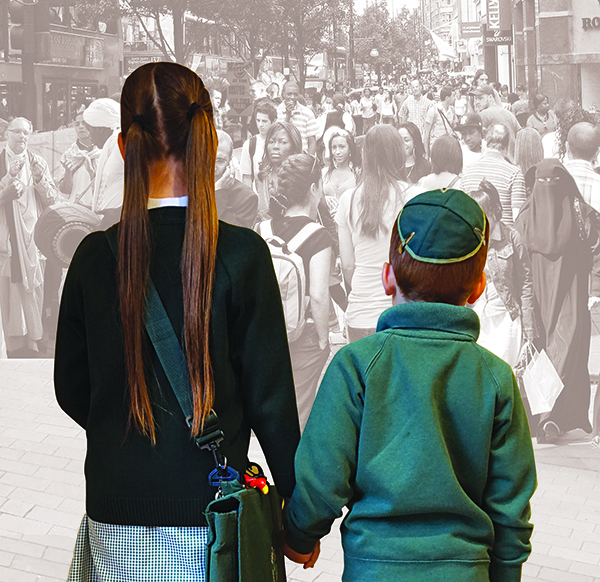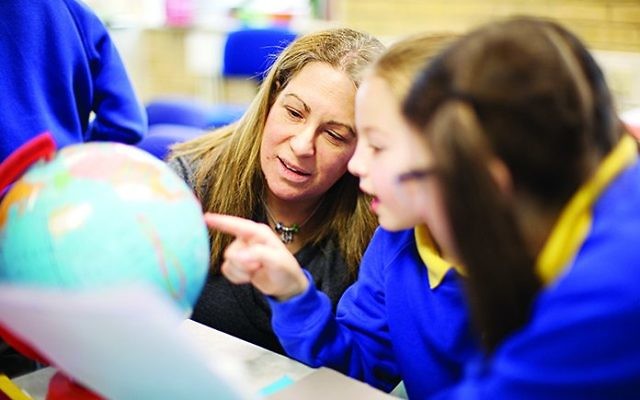Is a Jewish school right for a multicultural world?
 Our community has some of the best in the country, but do they stop us integrating? asks Caron Kemp.
Our community has some of the best in the country, but do they stop us integrating? asks Caron Kemp.
They are widely accepted as among the best in the country, they nurture and educate a large proportion of our community’s children and they produce graduates that often remain friends for life.
But are Jewish schools sheltering our offspring from the world around them? Are they inhibiting tolerance? And are they fuelling the ‘them and us’ attitude?
When Bushey mum Lauren Nathan was looking at schools for her eldest daughter, she felt compelled to buck the trend and apply for her local state primary.
Having herself grown up in Surrey where her own Jewish identity came from home rather than school, and with a strong affiliation to Edgware and District Reform Synagogue, she was keen to replicate this upbringing with her daughters.
“Primarily, I am of the belief that Jewish identity comes from the home,” she explains.
“We do not live in a bubble but rather we are British citizens and we have a duty to acknowledge that in our everyday lives.
“Not only is it vital that our children understand what other people are like and actually that they are like us with no big differences, but also how will we ever overcome misconceptions others have about Jewish people if we don’t mix with them?”
Now a trustee for the pluralist LL Primary School, which hopes to open in Borehamwood in 2016 and will welcome Jewish and non-Jewish children, Lauren, who is a teacher by profession, thinks it is time to rethink our educational strategy.
“LL Primary School, which aptly stands for Love Learning, is for me the perfect marriage of a solid Jewish grounding alongside an understanding that the world is wider than just us,” she clarifies.
“How will anti-Semitism ever decrease if we aren’t there to dispel the myths? Living in a multi-cultural society we have a duty to live amongst it and what better environment to do so than at school.”
But for Allyson Shaw, who has an eight-year-old daughter, we currently have an imperfect situation.
“It was never my intention to send my child to a Jewish school as I was educated in a non-denominational school and had friends from all sorts of different backgrounds,” she explains.
“It wasn’t unusual for me to have tea with a Hindu friend on Tuesday and go swimming with a Jewish friend the next day. But schools have changed. In some English isn’t the first language and you can count Jewish pupils on one hand. So I made a choice , but I worry about her having a false perception of what the real world is like and have actively sought to get her into clubs outside school that are not Jewish. But where we live dictates the audience.”
Yet rather than see Jewish primary schooling as a negative to be worked around, Rabbi David Meyer, executive director of Partnerships for Jewish Schools, perceives it as wholly beneficial for our offspring.
“There are significant advantages to educating children in a homogenous group,” he claims.
“Many children, especially at primary age, are self-conscious and can be reluctant to ask or explore sensitive topics. By placing them in schools with other Jewish children it enables them to learn about their own culture and traditions as well as the wider society, in a supportive framework.”
However, while faith primary schools once again dominated the top end of last year’s league tables, making up a staggering two-thirds of the best schools despite representing just a third of all schools nationally, they have also made the headlines for less positive reasons.
As well as the recent Trojan Horse scandal, which has been blamed for a spate of Ofsted inspectors downgrading faith schools for lacking a breadth of understanding with regards to tolerance and religious beliefs, a report published in March from the Social Integration Commission ruled that no new faith schools could be established unless they could prove that pupils would mix with children from other backgrounds. The inquiry described Britain’s education system as increasingly segregated along social, religious and racial lines.
But Moriah Jewish Day School headteacher Ruth Gafson is unfazed by the increased pressure to deliver on these rulings. “We pride ourselves on educating our children on the world around them in meaningful ways,” she explains.
“Whether by forging links with other local schools for collaborative projects or using our termly topics as a springboard to explore different religions and cultures, we fully embrace the opportunity to ensure that our children have a broad and fair understanding of their surroundings.
“Attending a Jewish school allows children to tangibly experience the awe and wonder of their religion in a unique and incredibly powerful way, but this is by no means at the expense of a solid integrated education in the world around them.”
Yet for one parent, who wishes to remain anonymous, the conflict of interest is palpable.
“My partner particularly wanted a Jewish school to give a good grounding of the Jewish faith and values as he felt that we don’t go to synagogue enough so they wouldn’t get this from there,” she admits.
“But it really bothers me because I think they get a skewed sense of the world. There are very few children of colour in their school, so they mostly mingle with only white children, and don’t really get exposed to other cultures apart from British and Israeli. I think this shrinks their world in a negative way.”
And the mum of two feels this puts added pressure on parents to redress the balance.
“I have purposefully tried not to choose Jewish camps or activities, which is a shame,” she adds. “I’m also trying to cultivate friendships outside of school where the children are of a different religion. But it’s hard and unsatisfactory.”
Nevertheless, Rabbi Meyer is encouraging the blurring of lines between school and home life.
“The recent British Values initiative has brought to the fore the need to educate children about other religions and cultures and these classes will be taking place in all schools.
“As with all aspects of a child’s education, if a parent wishes to supplement the curriculum with further study there is a considerable amount of information available on the web, as well as in local bookstores.”

Thank you for helping to make Jewish News the leading source of news and opinion for the UK Jewish community. Today we're asking for your invaluable help to continue putting our community first in everything we do.
For as little as £5 a month you can help sustain the vital work we do in celebrating and standing up for Jewish life in Britain.
Jewish News holds our community together and keeps us connected. Like a synagogue, it’s where people turn to feel part of something bigger. It also proudly shows the rest of Britain the vibrancy and rich culture of modern Jewish life.
You can make a quick and easy one-off or monthly contribution of £5, £10, £20 or any other sum you’re comfortable with.
100% of your donation will help us continue celebrating our community, in all its dynamic diversity...
Engaging
Being a community platform means so much more than producing a newspaper and website. One of our proudest roles is media partnering with our invaluable charities to amplify the outstanding work they do to help us all.
Celebrating
There’s no shortage of oys in the world but Jewish News takes every opportunity to celebrate the joys too, through projects like Night of Heroes, 40 Under 40 and other compelling countdowns that make the community kvell with pride.
Pioneering
In the first collaboration between media outlets from different faiths, Jewish News worked with British Muslim TV and Church Times to produce a list of young activists leading the way on interfaith understanding.
Campaigning
Royal Mail issued a stamp honouring Holocaust hero Sir Nicholas Winton after a Jewish News campaign attracted more than 100,000 backers. Jewish Newsalso produces special editions of the paper highlighting pressing issues including mental health and Holocaust remembrance.
Easy access
In an age when news is readily accessible, Jewish News provides high-quality content free online and offline, removing any financial barriers to connecting people.
Voice of our community to wider society
The Jewish News team regularly appears on TV, radio and on the pages of the national press to comment on stories about the Jewish community. Easy access to the paper on the streets of London also means Jewish News provides an invaluable window into the community for the country at large.
We hope you agree all this is worth preserving.

























